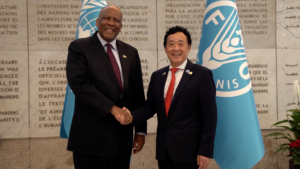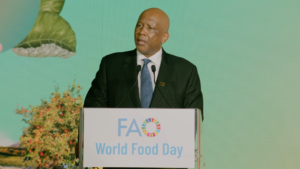This is an excerpt of an interview with FAO Special Goodwill Ambassador for Nutrition King Letsie III of Lesotho that will be released as part of the Goodwill Ambassador Series, jointly hosted by Talking Foreign Affairs with Adil Cader and the United Nations Association of Australia Young Professionals Network (UNAA YPN). The series seeks to raise awareness of the global challenges that Goodwill Ambassadors tackle in pursuit of the Sustainable Development Goals (SDGs) and inspire young people to engage with international causes.
How did you get involved in the field of fighting food insecurity and with FAO as a Special Ambassador for Nutrition?
The simple answer to that is that the FAO extended an invitation to me to be the Special Goodwill Ambassador on Nutrition and this happened quite soon after I had started a similar role with the African Union. I felt that what the FAO is inviting me to do and what I was already doing for the African Union will complement each other and will allow me to have a bigger impact as I speak on these issues of nutrition.
For many, many years growing up in Lesotho, one witnessed a lot of hunger, a lot of poverty. And I could see that very, very few people are managing to escape this cycle of poverty. And with the invitation that came from the FAO, I felt that I had to now be involved and understand more deeply the issues and by understanding the issues then we would see how I can also contribute to the solutions of this hunger and malnutrition that is afflicting Lesotho and many, many African countries.

© FAO
What have been the core factors contributing to malnutrition and food insecurity in the African continent, especially in Lesotho and what have been the most effective ways to fight it?
In recent years, as you know, COVID we experienced globally, the COVID-19 pandemic that had a devastating effect on our ability and the farmer’s ability to grow food and have access to food and the rural population to have access to food and that did increase levels of hunger and malnutrition.
Of course, in Lesotho and in many other African countries, we are seeing season after season, month after month, having to deal with the negative impacts of climate change. And you can see that conflict is also a major focus on the continental level. It’s a major contributor to the issue of malnutrition and hunger. But we are trying to see how, particularly in Lesotho how we can improve the situation, despite the challenges.
I said one of the major challenges for us is the phenomenon of climate change, which comes with different characteristics. But we have to institute programs that can increase the resilience of the farmers that will introduce climate smart agriculture, so that we can adapt and see how we can protect our food production from the ravages of the weather and of climate change.
Why do you believe the issue of malnutrition has been neglected for so many years?
We know our governments across the continent, across the world, would like to do things, invest, and see results immediately, or soon, within a short period of time, mainly within a period of five years, or four years. So, because the results of investment in nutrition will not necessarily be realised within that five-year period, resources are allocated to programs that can produce quick results.
So that is, I think, one of the major reasons why governments up until now have not been really putting as much resources into nutrition as we would like. But we’re trying to make a difference. This is why I’m saying I’m constantly beating the nutrition drum. I sit in rooms and I look at them straight in their face and try to persuade them to increase their investment in nutrition and food security.
What role can developed countries play in supporting nutrition in the African continent?
Well, developed countries, as you know, that is where the major resources and the funds and the capital reside. So we would like, I think their role would be to continue to support us with resources, be financial, technical, and human resources, to try to make sure that we, as the developing countries, are effective and capable of dealing with the issues that we are talking about.
In some of the forums that I have attended in the past, we have called for developed countries to live up to their commitments, and to live up to their pledges that they often make to fund climate funds, climate change, and so we often ask them to live up to those promises, and also ask that we ask them to make it easier for us developing countries to access those climate funds, so that we can deal with these problems of malnutrition and hunger, and deal with the issues of mitigation and adaptation quickly, quicker, and we need resources if we are to succeed in doing that.

© FAO
This interview excerpt has been edited for length and clarity.